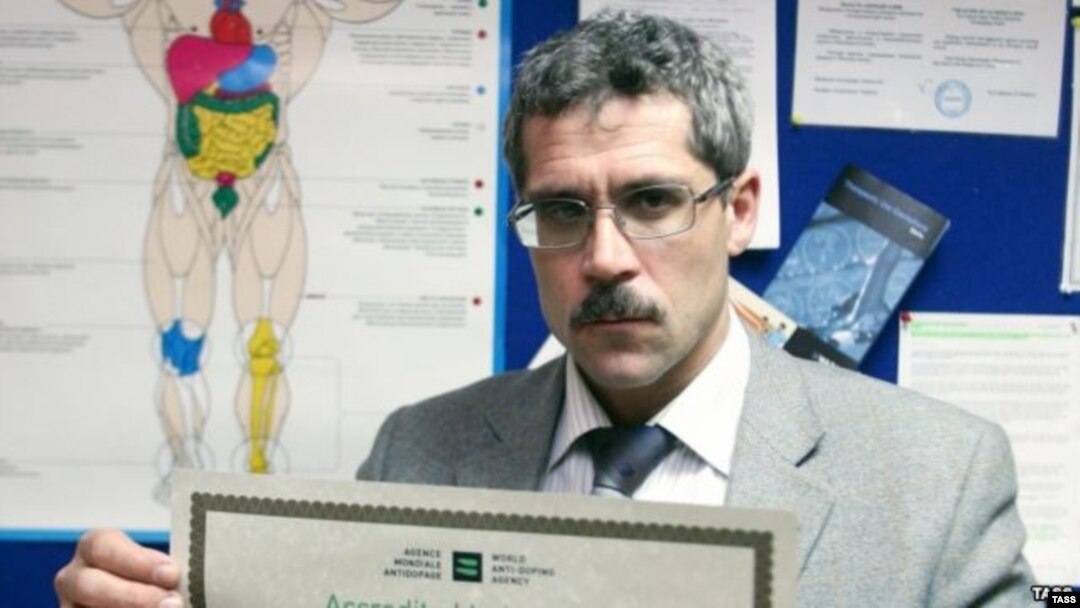The Kremlin has rejected claims made by a former anti-doping official that dozens of Russian athletes -- including more than a dozen medalists at the 2014 Winter Olympics -- were part of a large-scale, state-run doping program.
Presidential spokesman Dmitry Peskov, speaking to reporters in a May 13 conference call, described the allegations made by Grigory Rodchenkov as unsubstantiated slander by a "defector."
Rodchenkov, the ex-director of Russia's anti-doping agency RUSADA, told The New York Times on May 12 that he helped provide banned substances to athletes and replace drug-tainted testing samples with clean ones during the Sochi Olympics.
Rodchenkov, who was awarded a presidential order after the Sochi games, was later forced to resign and has since fled to the United States.
"These allegations look absolutely groundless," Peskov said on May 13. "They are not substantiated by any trustworthy data, they are not backed by any documents."
The International Olympic Committee (IOC), however, on May 13 described the accusations as "very worrying," and called for an immediate investigation.
"The laboratory in Sochi was fully accredited by WADA, the World Anti-Doping Agency," an IOC spokesman said. "Based on the findings of a WADA inquiry, the IOC will not hesitate to act with its usual policy of zero tolerance for doping and defending the clean athletes."
WADA investigation
WADA announced on May 13 that it had opened a probe into Rodchenkov's claims.
The New York Times quoted Rodchenkov as saying that Russian athletes provided clean urine samples ahead of the Sochi Games that were then used to replace tainted samples taken during the Olympics. Bottles of urine, he said, were passed to the lab for testing through a small hole in the wall.
Rodchenkov said the scheme, which involved athletes, officials, and intelligence agencies, worked "like a Swiss watch."
Rodchenkov alleged he used three forbidden substances to make a cocktail that was used by Russian athletes to dramatically improve their performance.
But two Russian athletes whose names were on a list shown to the newspaper by Rodchenkov have denied the accusations, calling them a campaign to tarnish the prestige of Russian sport.
Cross-country skier Aleksandr Legkov, who won gold and silver at Sochi, told the Sport Ekspres newspaper that "I am sure of myself 300 million percent."
Aleksandr Zubkov, a bobsledder who won two golds, told the Russian sports daily that the claims were "complete slander against the athletes of the Russian team and against me as an individual."
Russia topped the Sochi medal table with 33 medals, including 13 golds.
Rodchenkov's allegations come amid growing suspicion about Russia's anti-doping conduct.
Track & Field team suspension
The country's track-and-field team is currently suspended from competition, owing to a WADA commission report that alleged widespread doping in Russian sport, and faces a possible ban from participating in the upcoming Olympic Games in Rio.
Russia has taken numerous steps aimed at getting into compliance in time for the games. When asked about the prospects of Russian athletes being allowed to compete in Rio, Peskov said, "We hope everything will be fine."
The latest revelations come after a whistle-blower told the U.S. investigative news program 60 Minutes that at least four Russian gold medalists in Sochi were using steroids.
Russian athletes have also come under scrutiny after testing positive for using the recently banned drug meldonium.
Two former RUSADA executives, Nikita Kamayev and Vyacheslav Sinev, died in February less than two weeks apart. RUSADA said the 52-year-old Kamayev died of a heart attack after skiing, and did not elaborate on the cause of death for Sinev, 58.
With reporting by Reuters, AFP, dpa, AP, and BBC


